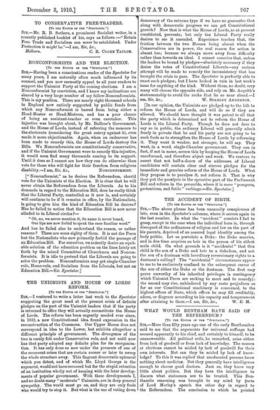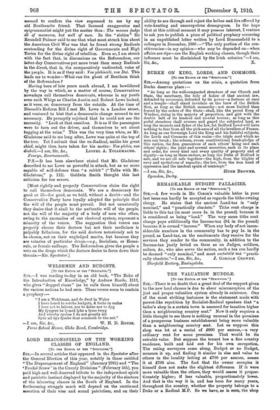WHAT WOULD BENTHAM HAVE SAID OF THE REFERENDUM ?
[To THE EDITOR OF THE "SPECTATOR."]
SIR,—More than fifty years ago one of the early Benthamites said to me that the arguments for universal suffrage had seemed apparently to his chief, and certainly to himself, to be unanswerable. All political evils, he remarked, arise either from lack of goodwill or from lack of knowledge. The masses at elections cannot be misled by lack of goodwill for their own interests. But can they be misled by lack of know. ledge ? To this it was replied that uneducated persons know nothing about medicinp. But they generally have intelligence enough to choose good doctors. Just so, they know very little about politics. But they have the intelligence to discern what statesmen are to be trusted. This Ben- thamite reasoning was brought to my mind by arte of Lord Morley's speech the other day in regard to the Referendum. The conclusion to which he pointed seemed to confirm the view expressed to me by my old Benthamite friend. That licensed exaggerator and epigrammatist might put the matter thus : The masses judge at of measures, but well of men. In the " sixties " Sir Roundell Palmer said to me that what most struck him about the American Civil War was that he found strong Radicals contending for the divine right of Governments and High Tories for the divine right of rebellion. Even so, I am struck with the fact that, in discussions on the Referendum, our latter-day Conservatives put more trust than many Radicals in the direct, that is, the comparatively undirected, voice of the people. It is as if they said : Vox plebisciti, vox Dei. This leads me to wonder—What can the ghost of Bentham think of the Referendum ?
Having been of late years much abroad, I am bewildered by the way in which, as a matter of course, Conservatives nowadays call themselves democrats, whereas in my youth even such Whigs as Charles Austin and Robert Lowe looked, as it were, on democracy from the outside. At the time of Disraeli's Reform Bill I met Mr. Lowe in a London street, and ventured to hint that a democratic change seemed to me necessary. He promptly rejoined that he could not see the necessity. "Look at that omnibus. It is as if the passengers were to turn out the driver, and themselves to set about tugging at the reins." This was the very time when, as Mr. Gladstone said to me long after, Lowe was quite at the top of the tree. Yet I submit that the ex-Radical, unlike his great chief, might then have taken for his motto : Vox plebis, von
P.S.—It has been elsewhere stated that Mr. Gladstone described to me Lowe as powerful in attack, but as no more capable of self-defence than "a rabbit" (" Talks with Mr. Gladstone," p. 112). Goldwin Smith thought this last criticism far too severe.
[Most rightly and properly Conservatives claim the right to call themselves democrats. We are a democracy for good or ill—for good, as we bold, without a doubt—and the Conservative Party have loyally adopted the principle that the will of the people must prevail. But not unnaturally they desire that it shall be the authentic will of the people, not the will of the majority of a body of men who often, owing to the anomalies of our electoral system, represent a minority of the voters. The suggestion that voters can properly choose their doctors but not their medicines is palpably fallacious, for the said doctors notoriously ask to be chosen, not on their unpledged merits, but because they are votaries of particular drugs,--e.g., Socialism, or Home- rule, or female suffrage. The Referendum gives the people a veto on the drugs which the doctors desire to force down their throats.—En. Spectator.]











































































 Previous page
Previous page